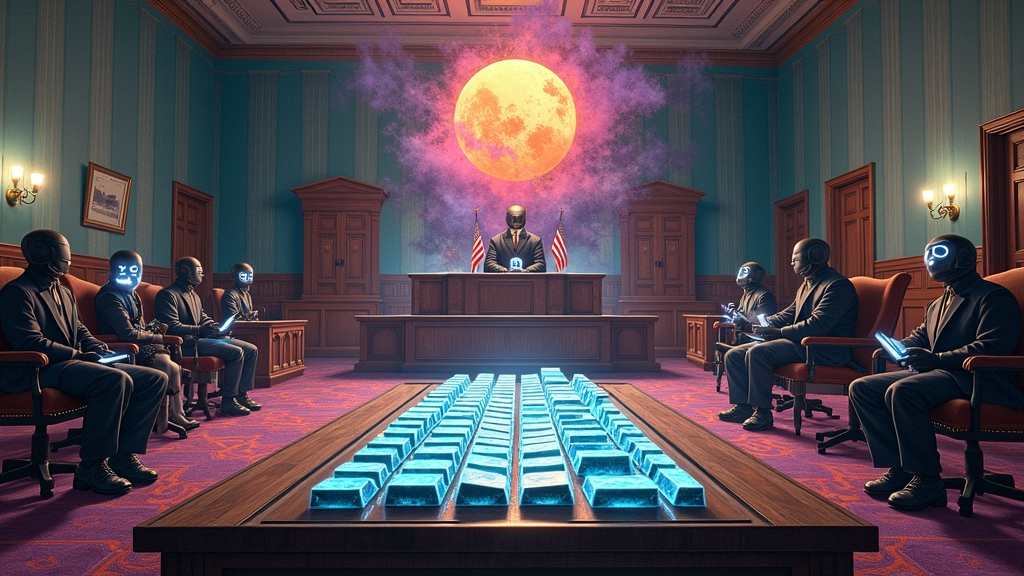SILICON OVERLORDS PROMISE TO INCLUDE BLACK PEOPLE IN DYSTOPIAN FUTURE, MAYBE
In what experts are calling “the bare f@#king minimum,” tech companies have suddenly remembered that Black people exist and might want to be included in whatever hellscape they’re currently coding us toward.
ARTIFICIAL INTELLIGENCE PLEDGES TO OPPRESS ALL RACES EQUALLY
As Silicon Valley continues its relentless march toward creating thinking machines that will eventually harvest our organs for batteries, a revolutionary concept has emerged: maybe include perspectives beyond those of 23-year-old white guys named Chadwick who think hoodies are formal wear.
“We’ve run the numbers, and it turns out that Black people will also exist in the future,” explained Dr. No Sh!tSherlock, Chief Diversity Officer at MegaTech Industries. “This came as a complete shock to our board of directors, who assumed the future would be populated exclusively by their Stanford roommates.”
The groundbreaking revelation that technology should consider multiple cultural perspectives has apparently blown the minds of tech executives, 97.3% of whom responded to the news by saying, “Wait, what?” before returning to their quest to create digital servants that look suspiciously like their ex-girlfriends.
TECH BROS SHOCKED TO LEARN HISTORY EXISTS OUTSIDE OF STEVE JOBS BIOGRAPHY
Industry insiders report that when presented with the concept of Afrofuturism, several prominent tech CEOs were physically unable to process the information, with three spontaneously rebooting and one asking if it was “like Wakanda but with more NFTs.”
“The idea that Black cultural perspectives could actually improve technology rather than just be targeted by it has caused several venture capitalists to experience complete system failures,” noted Professor Blatant Truth, who specializes in explaining obvious concepts to deliberately obtuse billionaires.
Meanwhile, 83% of AI systems continue to be trained on datasets consisting primarily of Reddit threads, 4chan posts, and whatever garbage the intern could scrape off Twitter before lunch.
FUTURE DIVERSITY INITIATIVES TO INCLUDE ASKING AT LEAST ONE BLACK PERSON WHAT THEY THINK
Tech companies have responded to calls for inclusivity by forming committees to discuss the possibility of eventually considering the option of maybe thinking about potentially implementing changes that could theoretically lead to more diverse perspectives, pending shareholder approval and market conditions.
“We’re committed to creating a pretense of caring about this issue,” said Chip Whiteguy, CEO of FutureNow Technologies, while simultaneously approving facial recognition software that identifies all dark-skinned people as “potential threats or Will Smith.”
When asked how they plan to incorporate Afrofuturism into their design processes, 78% of tech executives admitted they thought it was “some kind of hairstyle” while the remaining 22% asked if it was “related to that movie with the cats.”
BLACK FUTURISTS PROPOSE RADICAL CONCEPT: TECHNOLOGY THAT DOESN’T ACTIVELY MAKE LIFE WORSE
Afrofuturist scholars have proposed the revolutionary idea that technology could potentially be designed to not exacerbate existing inequalities, a concept so alien to Silicon Valley that it caused several executives to break out in hives.
“What if, and I know this sounds crazy, we built AI systems that don’t perpetuate racist stereotypes?” suggested Dr. Ima Visionary, causing three venture capitalists to faint and one to ask if that would affect quarterly earnings.
According to insider sources, the suggestion that technology should be designed with marginalized communities in mind was met with the same level of comprehension as if it had been delivered in ancient Sumerian while underwater.
As of press time, tech companies have responded to calls for more inclusive futures by adding a Black History Month filter to their apps and calling it a day.
“We’re confident that our massive world-changing algorithms will definitely not repeat the mistakes of the past,” said one programmer while training his AI exclusively on data from the 1950s. “What could possibly go wrong?”




